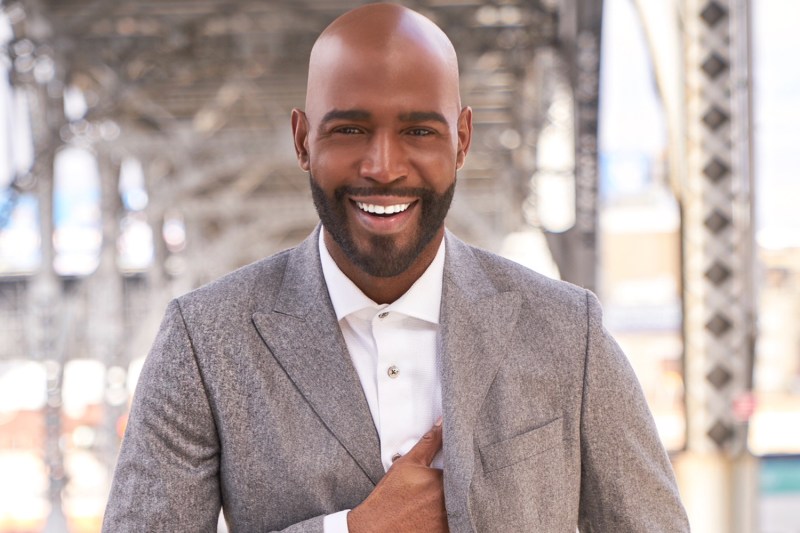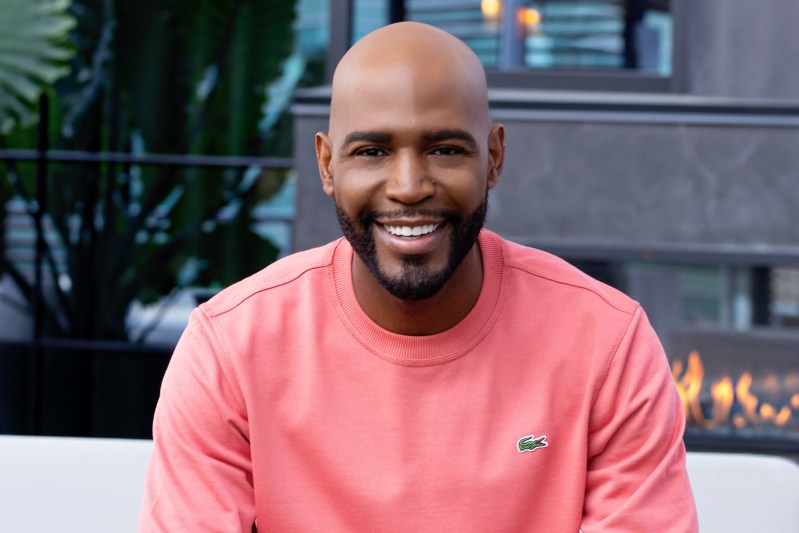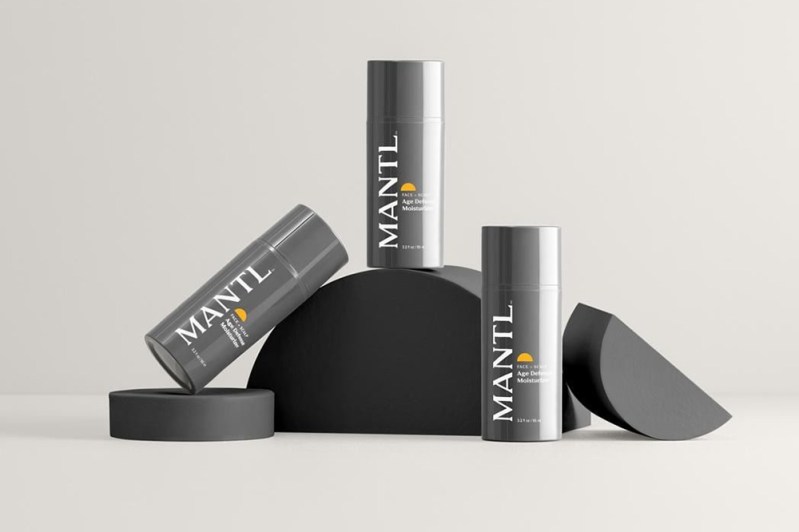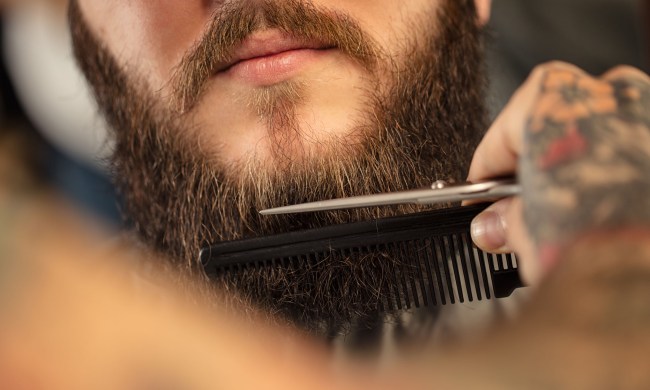
Even in the midst of all this despair, Karamo Brown still manages to find the good in the world. After all, Brown, who has worked in social services, has made a career helping people across the country unpack and work through their deepest emotional baggage — all the while sporting his signature sparkly bomber jackets — on Netflix’s binge-worthy makeover show Queer Eye, which is launching its fifth season on June 5.
And he continues to help others outside his day job. In his weekly eponymous podcast on Luminary (now in its second season), Brown offers salient advice to struggling listeners who call in from around the world, and connects them with his celebrity friends who have experienced similar challenges. In February, he launched Mantl, an inclusive grooming line for people who are balding.
Here, he talks to The Manual about his empowering ventures, Queer Eye’s new season, and how all of us can take better care of ourselves during these turbulent times.
How has quarantine life been for your family?
We’ve been really lucky. We’re fortunate enough to be able to stay at home in Los Angeles, Netflix has been really great about my job. We’ve been trying to help a lot of our friends, and people in my DMs (social media inbox) navigate the wave of emotions they’re going through. One day people are happy, another day people are down.
Right now it’s a lot about supporting others as we’ve been so blessed at this time.
What are some of the anxieties people have been expressing to you? How have you advised them to get through these anxieties?
All of them come back to one thing — grief. A lot of the time, when people think of loss, they think of death, and that’s the only time you’re allowed to grieve. What people don’t realize is that [nowadays] you’re grieving consistently, almost all the time. It’s up to you to acknowledge that loss, and start to heal from it.
For instance, the lack of schedule, the lack of certainty about tomorrow, you have to grieve that, because in your mind, you had to put together a schedule, you knew what this summer would be like, and you had an idea of what the future would look like. Now those things and the life that you were accustomed to are gone, and you’re unsure if you’ll ever get that financial and emotional stability back.
It’s similar to when someone dies, or when someone has a breakup. You have to say, “Wow, this is gone. How does this make me feel?” That way, you can process what you’ve learned from this experience, and then lean on your support system. That’s the only way to deal with grief.
You also have to be patient with yourself. Give yourself time to process this grief. If someone passed away right now, you’d never say to yourself, “Oh, get over it in a day.” You have to give yourself time to cry and heal and do all of those things.
Congratulations on Season 2 of your Luminary Podcast. How did this series come about?

On Queer Eye, I help people get to the mental core of what their issues are. So outside of the show, in my DMs, or even when the Fab Five (Brown’s Queer Eye castmates) do public appearances, people come up to my castmates and say, “Oh my god! Let’s party!” or “Please braid my hair!” and I have a line of people saying, “Oh my god, my grandmother passed away. I don’t know how to deal with this,” or “I’m dealing with abuse.”
And so over the past couple of years, I realized that people come to me for emotional support that they don’t have in their lives. So I was trying to figure out a way outside of Queer Eye that I could give people that emotional support.
In season 1 of the podcast, I had a 1-800 number that anyone from around the world could call in and speak with me. I had to change that in season 2, because I’d be getting 40 to 50 calls per episode, and that was a lot to take on for one person.
But this season, we’re still helping listeners, but I pair them with a celebrity who dealt with a similar issue, and who overcame that issue, so not only are you hearing from strangers, you’re hearing from someone you know, and I combined those two elements to show the human experience, how no matter if you have a million dollars, or if you’re working class, we all experience the same thing, and through those connections and talking about them, we get better. I’m so proud of season 2, because listeners are still getting that healing, and they’re also like, “Oh wow, I didn’t know so and so went through that.”
What did you learn about yourself through this podcast?
Overall, what I learned is that we’re all connected. In season 2, I talked to someone from India, then spoke to someone in a small city outside of Philadelphia, and it’s as if these two people wrote a script, and are reading from the same script — they’re both going through the exact same thing.
I think we allow these external things like race and wealth — these things that people in power have used to divide us for so long — we let those things keep us apart. But the thing is that when we have people dividing us through topics that are politicized (like this pandemic), we lose that human connection. On my podcast, you just realize that we’re all going through it, whether you’re gay, straight, trans, pan, black, white, or latino.
Also, I learned how to set boundaries. As a caregiver, and being the strong one in most of my relationships, I realized I was consistently giving myself so that I can help others. And it came to the point where I was telling myself that I have a little more capacity to give, let me try to give more, let me help.
What I know to be in life is that we forget to check up on the strong people in our life, and ask them how they’re doing. As stronger people who give a lot, we forget to set clear boundaries for ourselves. For me, it’s about saying, “I want to help, but I have to make sure the amount of time I’m giving to other people is equal to the time I’m giving to myself.”
How do you practice self care right now? What do you do to decompress?
The first thing I did was stop comparing myself to others on social media. The other day, I posted a video on my social media saying like come on, everybody is on Tik Tok dancing and exercising, am I the only the one who’s in my pajamas?
It’s very easy to look online and say, “Oh my gosh, they’re working out, they’re getting married, they’re doing that.” That’s not healthy. We’re all on our own emotional and mental journeys during this challenging time. I’ve limited my social media during the day.
Another thing I’ve been doing is not allowing others to guilt me for not giving enough support. I’ve heard people say, “Oh my gosh, because during these hard times you didn’t call me enough, that means you don’t like me as a friend.” I’ve not allowed people to put this guilt trip on me that I’m not doing enough for them, while I’m trying to do enough for myself.
Right now I’ve been taking time to spend time with my family. I’m on season 8 of Game of Thrones 10 years late. All of this is self care for me.
Speaking of self care, let’s talk about the launch of Mantl. Why did you develop this grooming line?

My cofounders and I came together and realized there was no product for balding people. For people who are balding, all the messages you see on television are that if you’re bald, you’re not gonna get the person or life that you want, you’re not sexy or attractive.
But balding happens to over half of men. And we all lose our hair as we get older. So why are we sitting here telling people through fear marketing that they’re not gonna have the life they want? These messages penetrated me, and I’m a pretty strong person.
During the first two seasons of Queer Eye, I drew in my hairline every episode. There was a recurring joke with the Fab Five that you would know where I sat in the car, because when we went over a bump, my hairline would be on the roof.
I would laugh off the joke with my castmates, but inside it was killing me. Here I was telling people to be authentic, and this one area of my life I had to evaluate why I was so ashamed of having a bald head.
I think it’s because everything I ever heard as a child, from friends, and the media is that you need a thick head of hair to be beautiful, and I came to realize that this was wrong.
That’s why we came up with this product line. It’s been great seeing how people have responded. We have a big announcement coming up soon about where we’re going to be sold. We’ve been selling out because of our message, and our products work. Our SPF, unlike a lot of sunscreens, is clear. And if you pair it with our cleanser and moisturizer, you’ll see your skin start to clear up, black spots will go away, and your skin will get smoother. Mantl was a real labor of love for me. I try not to do anything in my career that’s not authentic and real.
So for us at Mantl, we’re talking to people to help them unlearn this idea that balding is not beautiful, that what’s happening to you naturally is not beautiful, and also not rushing people. We’re saying you’re on your journey, and to embrace yourself. We’re here for you no matter if you have a full head of hair that’s just starting to thin, or if it’s all gone. Embrace it, because you’re still beautiful.
What does beauty mean to you?
Beauty for me is about learning what you love in yourself and about yourself. I don’t think there is a standard of beauty. I’m someone who has advocated for and dated people who are short, tall, skinny, bigger, black, white, and latino and so on. I don’t have a standard of beauty in my head, because I think everyone has beautiful qualities about them.
We’ve made strides in the female beauty space about redefining beauty, but in the male beauty space, it’s still very antiquated: six pack abs, head full of hair, and, normally, Anglo-Saxon features. I was trying to live up to that standard as well, but at some point you have to give up.
Just from quarantine, I’ve gained nine pounds, and I looked at my body and said, “Hey, you’re still beautiful.” I know I sound crazy talking to myself, but you have to be able to say, “You changed, but you still look good.” If a seed went from a seed to a flower, you wouldn’t be like, “Gross!” You’d be like, “Oh, you’ve changed, and you’re still beautiful.” We have to start talking about this and allow men to be more vulnerable about their body image the same way we starting to with women.
Let’s talk about the new season of Queer Eye. What are you most proud of this season?
In the past, we’ve normally done a lot of one-on-one sessions with our heroes (the person we’re helping), but one of the things I’m most proud of this season is that we were able to do more couples, families, and group sessions where people can really see how they interact at home with the people in their life.
In the previous season, I had the opportunity to bring together a gentleman in a wheelchair and the man who shot him. Because of the success of that episode, our producers have allowed me to take more of a liberty to make sure our that our hero — if there’s someone else in their life that needs to be part of the conversation — we could have that conversation, because the healing begins with the hero, but healing also has to happen with the people around them.
So I’m really proud of the fact that people are going to see more ways they can navigate their personal relationships, their intimate relationships, and their family relationships. I think a lot of people want to work on themselves and feel really good, but when they get out into the world, they don’t know how to have a conversation, for example, with their mom who’s been putting them down, or their friend who’s been badly influencing them. Our heroes learn how to set boundaries with the people in their life, so we’ll be showing a lot more of that.
Have you been able to spend time with the Fab Five during quarantine?
Besides Tan [France], who’s in Utah, the rest of us haven’t been apart. Jonathan [Van Ness], Bobby [Berk], Antoni [Porowski], and I are in the same city, and we’ve seen each other a lot.
We decided we’re not going to go out into the world and interact with other people, so we could come together at a social distance at our houses. So we’ve been doing that. We had a nice mini pool party the other day with my fiancé, Bobby, and his husband. So yeah, we’ve been seeing each other a lot. I can’t get away from those bastards, I love them too much.


